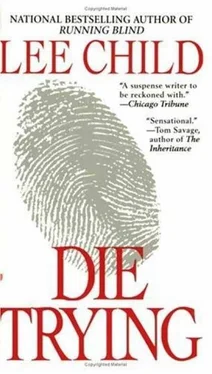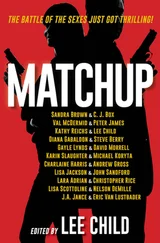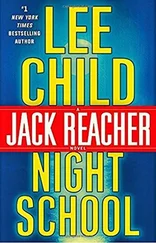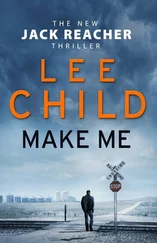“He could be experiencing difficulties, sir,” Webster said. “And he’s been told to be cautious. He doesn’t call in with a running commentary. He’s undercover, right? He can’t just disappear into the forest any old time he wants to.”
The President nodded. The pink smudge in the glass moved up and down. There was a measure of sympathy there.
“We understand that, Harland,” he said. “We really do. But we have to assume that with matters of this magnitude, he’s going to make a big effort, right? But you’ve heard nothing. So you’re giving us nothing but speculation.”
Webster spread his hands. Spoke directly to the back of the guy’s head.
“Sir, this is a big deal,” he said. “They’re arming themselves, they’ve taken a hostage, they’re talking about secession from the Union.”
The President nodded.
“Don’t you understand, that’s the problem?” he said. “If this were about three weirdos in a hut in the woods with a bomb, we’d send you in there right away. But it isn’t. This could lead to the biggest constitutional crisis since 1860.”
“So you agree with me,” Webster said. “You’re taking them seriously.”
The President shook his head. Sadly, like he was upset but not surprised Webster didn’t get the point.
“No,” he said. “We’re not taking them seriously. That’s what makes this whole thing so damn difficult. They’re a bunch of deluded idiots, seeing plots everywhere, conspiracies, muttering about independence for their scrubby little patch of worthless real estate. But the question is: how should a mature democratic nation react to that? Should it massacre them all, Harland? Is that how a mature nation reacts? Should it unleash deadly force against a few deluded idiot citizens? We spent a generation condemning the Soviets for doing that. Are we going to do the same thing?”
“They’re criminals, sir,” Webster said.
“Yes, they are,” the President agreed, patiently. “They’re counterfeiters, they own illegal weapons, they don’t pay federal taxes, they foment racial hatred, maybe they even robbed an armored car. But those are details, Harland. The broad picture is they’re disgruntled citizens. And how do we respond to that? We encourage disgruntled citizens in Eastern Europe to stand up and declare their nationhood, right? So how do we deal with our own disgruntled citizens, Harland? Declare war on them?”
Webster clamped his jaw. He felt adrift. Like the thick carpets and the quiet paint and the unfamiliar scented air inside the Oval Office were choking him.
“They’re criminals,” he said again. It was all he could think of to say.
The President nodded. Still a measure of sympathy.
“Yes, they are,” he agreed again. “But look at the broad picture, Harland. Look at their main offense. Their main offense is they hate their government. If we deal with them harshly for that, we could face a crisis. Like we said, there are maybe sixty million Americans ready to be tipped over the edge. This Administration is very aware of that, Harland. This Administration is going to tread very carefully.”
“But what about Holly?” he asked. “You can’t just sacrifice her.”
There was a long silence. The President kept his chair turned away.
“I can’t react because of her, either,” he said quietly. “I can’t allow myself to make this personal. Don’t you see that? A personal, emotional, angry response would be wrong. It would be a bad mistake. I have to wait and think. I’ve talked it over with the General. We’ve talked for hours. Frankly, Harland, he’s pissed at me, and again frankly, I don’t blame him. He’s just about my oldest friend, and he’s pissed at me. So don’t talk to me about sacrifice, Harland. Because sacrifice is what this office is all about. You put the greater good in front of friendship, in front of all your own interests. You do it all the time. It’s what being President means.”
There was another long silence.
“So what are you saying to me, Mr. President?” Webster asked.
Another long silence.
“I’m not saying anything to you,” the President said. “I’m saying you’re in personal command of the situation. I’m saying come see Mr. Dexter Monday morning, if there’s still a problem.”
NOBODY WAITED IN the car. Too restless for that. They got out into the chill mountain air and milled aimlessly around. Johnson and his aide strolled north with the driver and looked at the proposed location for the command post. McGrath and Brogan and Milosevic kept themselves apart as a threesome. McGrath smoked, lost in thought. Time to time, he would duck back into the Army Chevrolet and use the car phone. He called the Montana State Police, the power company, the phone company, the Forest Service.
Brogan and Milosevic strolled north. They found an armored vehicle. Not a tank, some kind of a personnel carrier. There was the officer who had met them with the car and maybe eight soldiers standing near it. Big, silent men, pitching tents on the shoulder in the lee of the rocks. Brogan and Milosevic nodded a greeting to them and strolled back south. They rejoined McGrath and waited.
Within forty minutes they all heard the faint roar of heavy diesels far to the south. The noise built and then burst around the curve. There was a small convoy of trucks. Big, boxy vehicles, mounted high on exaggerated drivetrains, big wheels, huge tires, axles grinding around. They roared nearer, moving slow in low gear. The officer from the car ran to meet them. Pointed them up to where he wanted them. They roared slowly past and stopped two abreast in the road where it straightened into the rock cutting.
There were four vehicles. Black and green camouflage, rolls of netting on the flanks, stenciled numbers and big single stars in white. The front two trucks bristled with antennas and small dishes. The rear two were accommodations. Each vehicle had hydraulic jacks at each corner. The drivers lowered the jacks and the weight came up off the tires. The jacks pushed against the camber of the road and leveled the floors. Then the engines cut off and the loud diesel roaring died into the mountain silence.
The four drivers vaulted down. They ran to the rear of their trucks and opened the doors. Reached in and folded down short aluminum ladders. Went up inside and flicked switches. The four interiors lit up with green light. The drivers came back out. Regrouped and saluted the officer.
“All yours, sir,” the point man said.
The officer nodded. Pointed to the Chevy.
“Drive back in that,” he said. “And forget you were ever here.”
The point man saluted again.
“Understood, sir,” he said.
The four drivers walked to the Chevy. Their boots were loud in the silence. They got in the car and fired it up. Turned in the road and disappeared south.
BACK IN HIS office, Webster found the Borken profile on his desk and a visitor waiting for him. Green uniform under a khaki trench coat, maybe sixty, sixty-two, iron-gray stubble on part of his head, battered brown leather briefcase under his arm, battered canvas suit carrier on the floor at his feet.
“I understand you need to talk to me,” the guy said.
“I’m General Garber. I was Jack Reacher’s CO for a number of years.”
Webster nodded.
“I’m going to Montana,” he said. “You can talk to me there.”
“We anticipated that,” Garber said. “If the Bureau can fly us out to Kalispell, the Air Force will take us on the rest of the way by helicopter.”
Webster nodded again. Buzzed through to his secretary. She was off duty.
“Shit,” Webster said.
“My driver is waiting,” Garber said. “He’ll take us out to Andrews.”
Webster called ahead from the car and the Bureau Lear was waiting ready. Twenty minutes after leaving the White House, Webster was in the air heading west over the center of the city. He wondered if the President could hear the scream of his engines through his thick bulletproof glass.
Читать дальше












